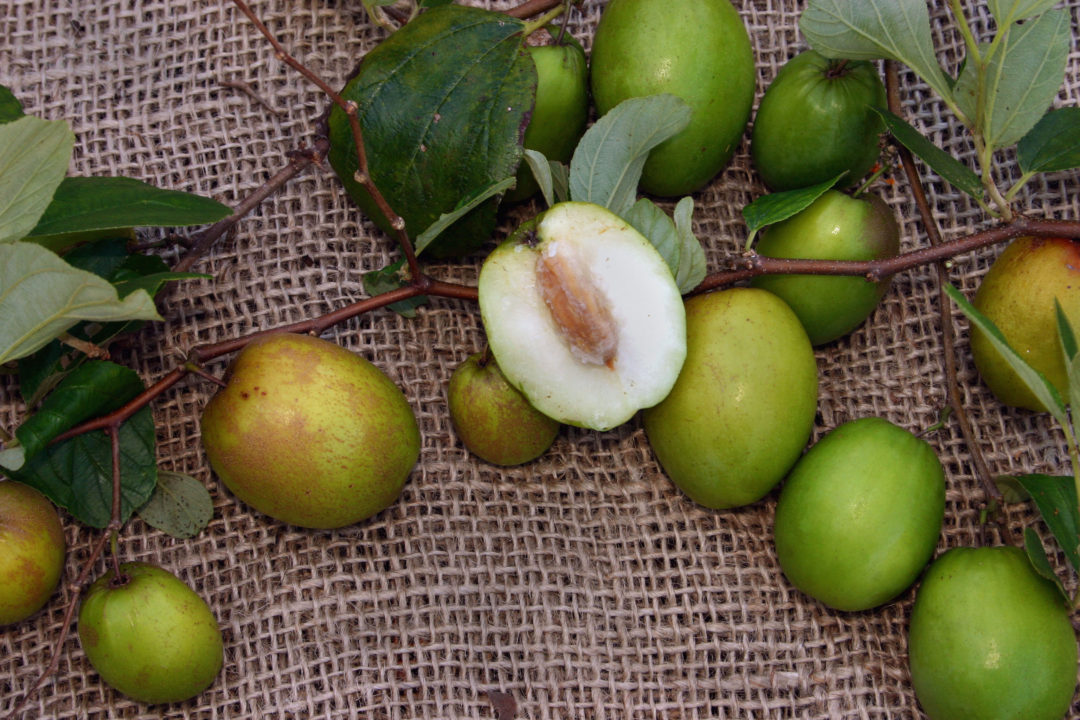Jujube, also known as Red Date or Korean Date is scientifically known as Ziziphus jujuba, here in lovely Guyana though, it is known as dungs, in some cases dounce and dunks.
For the purpose of this article, I will refer to it as “dungs”
What does it look like; how does it taste?
Dungs are usually small round berries about 3/4 inches in diameter. The fruit when green or unripe is firm and slightly acidic which is why it is probably enjoyed with salt and pepper here in Guyana. However, as it ripens, the colour changes from green to yellow, occasionally even developing a rust brown colour and a cracked texture. The center of the fruit contains a seed which is not edible.

Dungs | Image Source: https://redlandfruitandspice.com/whats-in-season/jujubes/
Interesting Health Benefits of the Jujube fruit
Irrespective of what you call it, this relatively small fruit comes packed with a ton of health benefits including:
- Regulates Circulation- because it is considered to be a rich source or iron and phosphorous, which are key ingredients in the red blood cells, persons suffering with low iron content or anemia, may find this a useful fruit.
- Aids in Digestion- This is mainly attributed to its fiber content, but the saponins and triterpenoids also play a part in this by optimizing the uptake of nutrients and promoting healthy movement of food through the bowels. This can help prevent constipation, cramping, bloating, and excess flatulence, as well as severe gastrointestinal conditions.
- the ability to improve skin health- the juice and extract have been used topically to treat various skin irritations and inflammations, including psoriasis, eczema, and acne. It can also help prevent the appearance of wrinkles and scars.
- aid in weight loss- With a low-calorie count and a high protein and fiber level, dungs can satisfy your nutritional needs and fill you up, which will prevent you from snacking in between meals. This will help you maintain your diet and prevent any additional weight gain.
- relieve stress and anxiety-it has been proven that this fruit has certain anxiolytic and soothing effects on the body. As with the benefits mentioned for insomniacs, the oil extract from dungs or even consuming it can impact one’s hormonal level and induce a calm, relaxed sensation through the mind and body.
For people who regularly suffer from chronic stress or anxiety, snacking on some dried dungs can help ease the mind and protect the body from the side effects of extended exposure to stress hormones.
- stimulate sleep- it is said that consuming an extract from the seed of this fruit which contain soothing organic compounds may offer relief to persons afflicted with insomnia or nighttime restlessness.
- boost immunity- due to its high anti oxidant content including vitamin C, Vitamin A and other various organic compounds and acids, this fruit is able to neutralize free radicals, which are responsible for many chronic diseases and illnesses within the body. Vitamin C also stimulates the production of white blood cells, the first line of defense of our immune system.
Other interesting health benefits include:
- relieve constipation
- protect the liver
- detoxify the body
- Improves Bone Strength
Cooking with dungs
Now here in Guyana the most popular way to eat dungs is with salt and pepper as we would do with almost every other fruit that suits our palette. But did you know you can actually cook, make tea and candied treats with dungs?
Some may say that this fruit when green tastes a bit like a sour apple and when ripe, like a date, but however you may describe the taste, there are a number of ways dungs can be used in the kitchen.
Lets look at a few:
Dungs Tea
Step 1: Combine the water, ginger root, cinnamon bark, and Asian pear. Place a large pot on the stove and add 1 gallon (3.8 liters) of water. Slice a ginger root into 1-inch (2.54-centimeter) pieces, and toss it into the pot. Add some cinnamon sticks and a sliced up Asian pear.
Do not peel the ginger root or the Asian pear.
Step 2: Pierce the jujubes before adding them into the pot. You can make a few cuts into each jujube with a knife or you can also prick them a few times with a fork.
Step 3: Simmer the water for 4 hours. Do not bring the water to a boil, as this can destroy the ginger’s beneficial properties. Instead, be patient and allow the water to come to a simmer over low heat
Step 4: Strain the tea. Use a slotted spoon to remove the ginger root, cinnamon, pear slices, and jujubes. You can discard them or reuse them in a recipe. Carefully pour the tea into clean bottles, pitchers, or jars–whatever is easier for you to pour from. To best preserve the flavor of the tea, use glass or ceramic containers.
Step 5: Drink the tea hot. Store any leftovers in the fridge for up to 10 days. You can reheat it later on or enjoy it cold.
Candied Jujubes
Step 1: Fill a large saucepan with 3⅓ cups (780 milliliters) of cold water. Add 3⅔ cups (825 grams) of sugar, and 2 teaspoons of cornstarch. Bring the water to a boil over medium to medium-high heat to dissolve the sugar and cornstarch
Step 2: wash and dry and dry 2 pounds (907 grams) of dried jujubes. Prick each one with a fork a few times. This will make it easier for them to absorb the water and sugar.
Step 3: Reduce the heat to a simmer over medium-low to low heat. Let them cook, uncovered, for 30 minutes. Ever so often, give the mixture a stir.
Step 4: Let the mixture reach room temperature first. Cover the saucepan with a lid, then store it in the fridge overnight.
Step 5: Place the saucepan on the stove and remove the lid. Bring the mixture to a boil over medium to medium-high heat. As soon as it is boiling, reduce the heat to a simmer. Allow it to cook, uncovered, for 30 minutes.
Step 6: Remove the jujubes from the pot using a slotted spoon. Set them aside on rimmed baking sheets lined with aluminum foil. Don’t try to cram them together on one sheet, or they won’t dry properly.
Don’t throw the syrup away! Keep boiling it until it reduces to 1⅓ cups (320 milliliters). Pour it into a glass bottle and use it as a syrup on pancakes and waffles. Store it in the fridge.
Step 7: Preheat your oven to 275°F (135°C). Place the baking sheets into the oven, and let the jujubes dry for 2 to 5 hours. Every so often, turn them over so that the other side dries. They are ready when they are dry like dates.
References:
- http://wiwords.com/word/dungs
- https://www.organicfacts.net/health-benefits/fruit/jujube.html
- https://www.wikihow.com/Cook-with-Jujubes
Discover more from Things Guyana
Subscribe to get the latest posts sent to your email.







